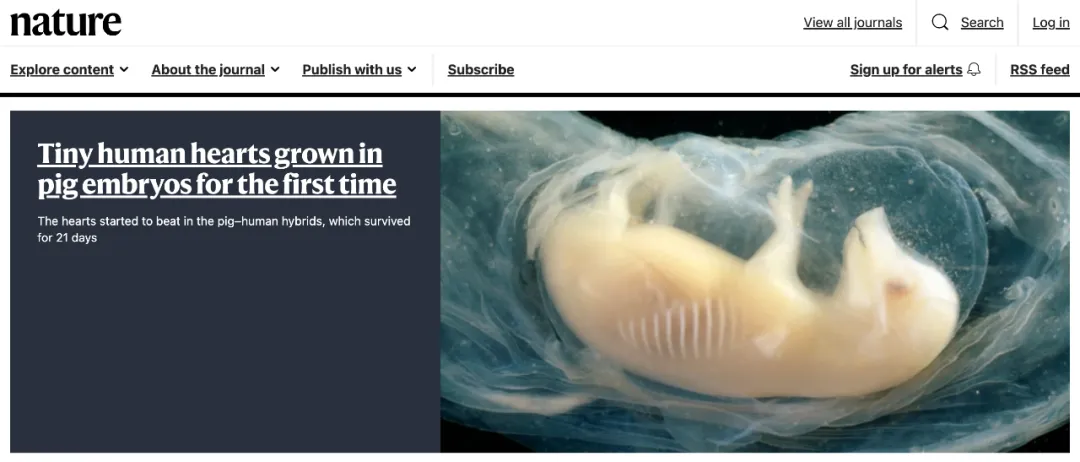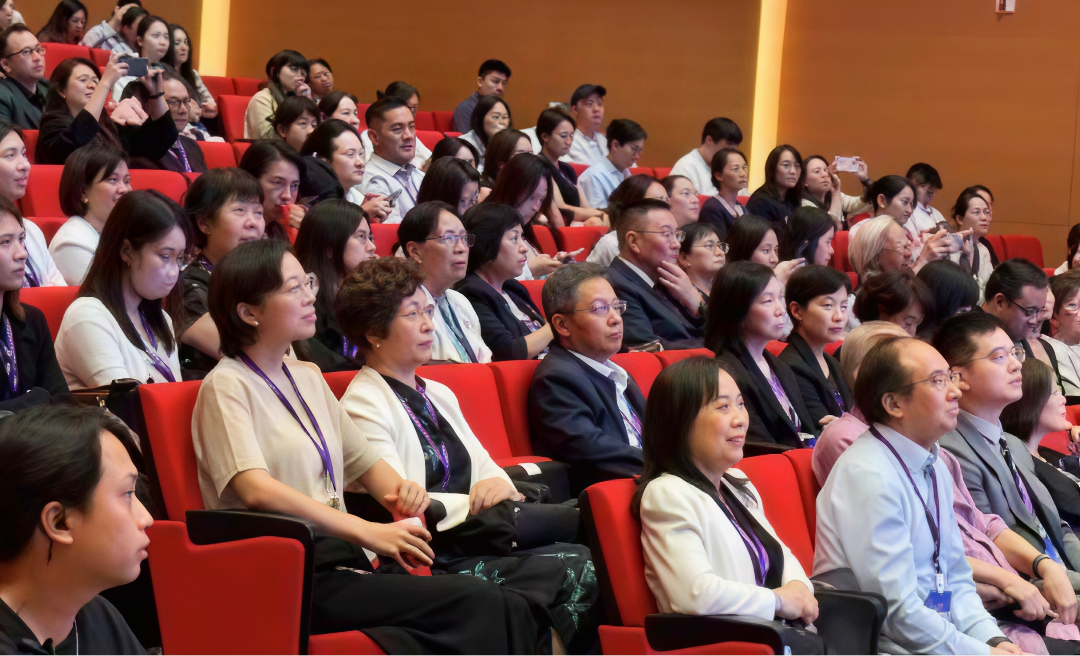Significant Achievements: Successfully Cultivated Human Heart in Pigs, Bringing New Hope for Organ Transplantation
Release time:
2025-06-19
Recently, the world's top - tier academic journal Nature featured a major research achievement by Chinese scientists on its front - page headlines. For the first time, a heart containing human cells was cultivated in a pig embryo, and this heart could beat autonomously and survived for 21 days. This groundbreaking progress offers a brand - new solution to the global shortage of organ transplants and marks a new stage in the development of xenogeneic organ cultivation technology.

Breakthrough: Human Heart Grown in Pig Embryo
This research was led by the team of Researcher Lai Liangxue from the Guangzhou Institute of Biomedicine and Health, Chinese Academy of Sciences. The research team adopted the human - animal chimeric technology. They used gene editing to knock out two key genes related to heart development in the pig embryo. Then, at the morula stage (when the embryo consists of about 32 cells), genetically enhanced human stem cells were injected. These stem cells had been specially modified to have stronger survival and proliferation abilities.
The research team confirmed that the pig embryo carrying human cardiac progenitor cells, constructed through advanced technological means, could develop smoothly in the surrogate sow for up to 21 days. Significantly, during this period, the heart tissue in the embryo had grown to a size comparable to that of a human embryo's heart at the same stage (about the size of a fingertip), and regular autonomous beating was observed.
Core Technology: The Exquisite Synergy of Gene Editing and Stem Cell Engineering
The core of this research lies in the cutting - edge "human - animal chimeric" cultivation strategy, with a rigorous and precise technical roadmap:
Targeted gene knockout: The research team first used gene - editing technologies such as CRISPR - Cas9 to precisely knock out two specific genes crucial for the normal development of the pig embryo's heart, creating space for the "take - over" of human cells.
Enhanced modification of human stem cells: The human stem cells injected into the embryo were not in their original state. Through gene reprogramming technology, the team introduced specific genes that could prevent cell death and promote cell growth into these stem cells, significantly enhancing their survival ability, adaptability, and competitiveness in the xenogeneic micro - environment of the pig embryo.
Precise spatio - temporal injection and in - vivo cultivation: At the early morula stage of the pig embryo's development, researchers precisely injected a small amount of the above - mentioned enhanced human stem cells. Subsequently, these chimeric embryos were transplanted into surrogate sows.
Existing Challenges and Future Directions: Survival Period and Cell Purity Are Key
Despite the remarkable achievements, the research team also clearly pointed out the severe challenges faced by the current technology:
21 - day survival limit: All chimeric embryos in the experiments stopped growing and died after developing for 21 days. Lai Liangxue analyzed that the presence of human cells in the heart tissue might have interfered with the original functional coordination or development program of the pig embryo's heart, resulting in the inability of the embryo to continue surviving.
Proportion of human cells and risk of immune rejection: The specific proportion of human cells in the cultivated heart tissue has not been announced in this report. Referring to the team's previous research on cultivating early human kidneys (mesonephros) in pigs (where the proportion of human cells reached 40% - 60%), there is still a considerable distance from the goal of "fully human - sourced" organs.
Scientific Significance and Prospects
Pigs are regarded as ideal donor candidates for xenogeneic organ transplantation and chimeric organ cultivation due to the high similarity of their organs in size, anatomical structure, and physiological function to those of humans. In recent years, preliminary explorations of short - term human transplantation of gene - edited pig kidneys and hearts have been successfully carried out. The human - animal chimeric technology aims to cultivate organs in animals that are fully compatible with human recipients, and it is considered one of the long - term strategies to solve the global problem of extreme organ shortage.
The team led by Lai Liangxue had previously successfully cultivated early human kidney tissue in pig embryos and maintained its survival for up to one month. This time, achieving the breakthrough of a beating function in the more complex heart tissue marks another major leap forward in this technological route.
Conclusion
This groundbreaking research brings revolutionary hope for the large - scale cultivation of transplantable human organs using large mammals. Although multiple obstacles still need to be overcome before clinical application, it undoubtedly lights a crucial scientific beacon for millions of desperate patients on the global organ waiting list. The grand vision of humans cultivating transplantable organs with the help of animals is gradually moving from basic laboratory research towards the realm of reality.
Latest developments
Public Welfare Partnership: A Special Letter from the Jinan Red Cross
On the afternoon of January 30, 2026, the Jinan Red Cross presented a letter of special significance to the Shandong Yinfeng Life Science Public Welfare Foundation (hereinafter referred to as the Yinfeng Foundation).
World’s First Achievement Highlights Brand Leadership
In the future, Yinfeng Life Science Research Institute will continue to uphold its mission of "Dedicated to Medical Technology, Safeguarding Human Health." It will empower brand building with more original and pioneering scientific and technological achievements, contributing wisdom and strength to Shandong's goal of building a national regional innovation hub and promoting Chinese brands on the global stage.
Global First Ovarian Tissue Dual Activation Technology Debuts at 2025 Jinan Achievements Conference
Currently, the ovarian tissue dual activation technology has been successfully applied in clinical practice at Beijing University of Chinese Medicine Shenzhen (Longgang) Hospital, having treated over 400 patients with a treatment success rate of 70%. Over the next three years, Shandong Yinfeng Life Science Research Institute plans to use Jinan as a center to gradually expand the transformation and application of this technological achievement nationwide.
According to the latest announcement from the International Society of Cryobiology, Professor Xu Yi from the School of Health Science and Engineering at the University of Shanghai for Science and Technology, and a member of the Yinfeng Cryomedicine Expert Committee, has been elected as a Board Governor of the Society for a three-year term (2026–2028). The election was conducted through a democratic vote by all members worldwide, with three new Board Governors elected. Professor Xu Yi is the only scholar from Asia elected to the Society’s Board of Governors this time and the third elected scholar from mainland China in the Society’s 60-year history.
The significance of life extension lies not only in technological breakthroughs but also in the shared belief of every individual who believes in "a better future." With faith as their torch, these fellow travelers join hands, pooling their strength to stride forward together. We firmly believe that as this steadfast support converges into a powerful force, it will propel the Yinfeng Life Extension Plan to gain broader attention, inject continuous momentum into the development of cryobiomedicine, and illuminate the next chapter of human civilization.
Over the two days, the symposium was not only a collision of ideas but also seeds sown to advance social progress in life culture. The Shandong Yinfeng Life Science Public Welfare Foundation will continue to use technology as wings and culture as roots, collaborating with all sectors of society to enhance the quality of life for the Chinese people and build a human-centered life care system.












